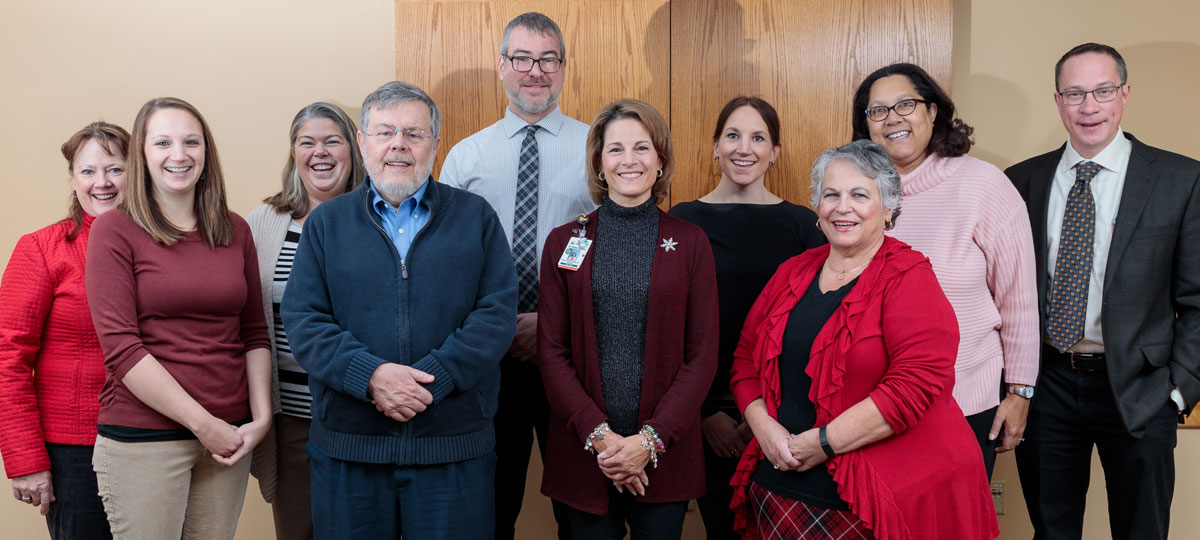
The New Face of Primary Care: A widening scope of wrap-around services
In 2005 Dr. Ellamarie Russo-DeMara left a private Obstetrics and Gynecology practice to join Gifford’s Primary Care team. Her focus gradually shifted from surgery and delivering babies to women’s wellness: she added menopause consultation and treatment (becoming Vermont’s first Certified Menopause Practitioners in 2009), and began offering genetic testing and counseling for hereditary breast and ovarian cancer.
“I was trained to care for all facets of women’s health, from adolescence to menopause,” she said. “I’ve always approached patient care in a holistic manner—listening to the patient and seeing the ‘whole picture’ is very important.”
The “whole picture” her patients shared increasingly included substance use disorders, and Russo-DeMara saw the difficulty these women had when seeking help.
“Addiction, like other chronic diseases such as diabetes or high blood pressure, should be approached as a medical illness and can be managed with medication. It is important for patients to remain stable in their recovery, and the babies of addicted pregnant women have a better outcome when their mother is treated,” she said. “Working in addiction medicine was the last thing I thought I’d be doing at this point in my career, but I find it very rewarding to see a patient getting their life back.”
Gifford had expanded Primary Care services to include medication assisted treatment (MAT), which combines medication and behavioral therapy to treat addiction. She trained for the program and by 2012 was prescribing Suboxone (which helps with opioid withdrawal) to women seeking help for their addiction. Dr. Ken Borie and Dr. Peter Thomashow also provide this treatment to patients in Randolph.
Within a year a licensed clinical care coordinator and a nurse from Gifford’s Community Health Team were supporting her practice, allowing Russo-DeMara to focus on her patients’ medication needs, overall health, and other clinical issues—from pregnancy to menopausal depression and anxiety that can trigger relapse. The care coordinator and nurse help with challenges that can threaten recovery: problems with childcare, housing, transportation, or finding counseling locally. Today Russo-DeMara provides MAT to more than 50 patients (many who have had babies while in the program), and she recently began treating males as well.
Primary Care that meets changing community healthcare needs
In 2010, Gifford brought Vermont’s Blueprint for Health programs to our community. These teams work closely with primary care providers, and they are a regular presence in each of our Primary Care clinics. They provide health coaching, care coordination, and offer support groups, workshops, and free Healthier Living classes in locations throughout Gifford’s service area.
Our primary care locations became Federally Qualified Health Centers in 2013, expanding our model of comprehensive primary care to include dental and behavioral health. In 2015 Gifford created a new in-house Behavioral Health program and began collaborating with local dentists to improve access to oral health care.
Addiction Medicine program expands behavioral health support
Primary care providers are seeing increasing numbers of patients with addiction issues. Russo-DeMara has found that nearly one-third of her MAT patients have become addicted after receiving opioids to manage pain after an accident, surgery, or a dental procedure.
“It became evident early on that a mental health component often influences patients who are struggling or at risk for addiction. Anxiety, depression, and abuse issues make recovery difficult. Addressing and treating the mental health component, along with the chemical addiction, is often necessary to sustain recovery.
In 2017 Dr. Christopher Lukonis, a board-certified psychiatrist also certified in addiction medicine, was brought on to head a newly created Addiction Medicine section. He works with primary care providers on pain medication guidelines, consults on care for patients tapering off opioids prescribed for chronic pain, and sees MAT patients in the Kingwood and Berlin clinics.
Dr. Lukonis joined Licensed Drug and Alcohol Counselor Jennifer Pelletier, who works closely with Gifford’s primary care practices to initiate a screening and referral process to identify patients at-risk for alcohol and substance dependence. The SBIRT (Screening, Brief Intervention, and Referral to Treatment) questionnaire is now part of all new patient and annual wellness visits.
“Our primary goal is to identify people at risk so we can intervene and help them avoid developing a disorder,” said Pelletier. “Uncovering an existing substance use disorder allows someone to receive early and more comprehensive care, which can lead to better treatment outcomes.”
Offering free education and support for a healthy lifestyle
The Community Health Team offers free workshops, support groups, and health coaching, which all encourage positive lifestyle changes like healthy eating, becoming more active and managing stress.
The Healthier Living workshops focus on specific topics including diabetes prevention, chronic pain management, and tobacco cessation; health coaching provides free support with goal setting and encouragement; and care coordination helps with access to care, connecting with community resources, and care planning.
When Rochester resident Cynthia Thurston learned she was at risk for Type 2 diabetes she enrolled in a Healthier Living workshop for diabetes prevention. She made lifestyle changes and lost more than 60 pounds, exercises regularly, and was so inspired that she became a lifestyle coach for the Diabetes Prevention Program.
Cynthia now teaches four diabetes prevention programs, including an evening class in Rochester, helping her friends and neighbors to get healthier. She is currently training to become tobacco cessation workshop facilitator.



